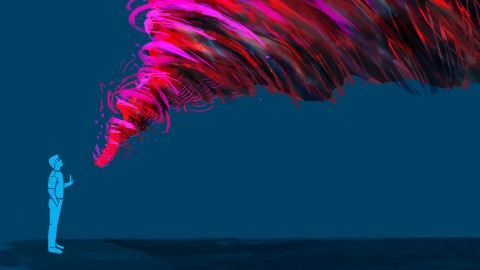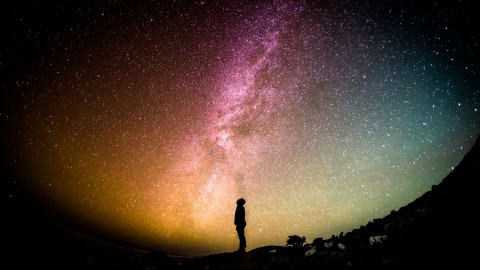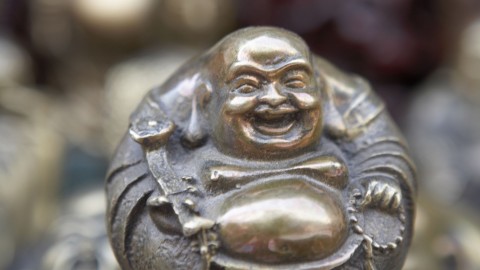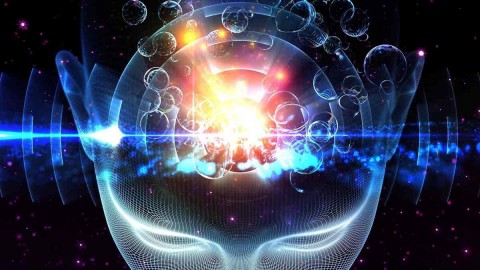“Man is being abolished,” says C. S. Lewis. “Good riddance,” says B. F. Skinner.
“How like a god,” says Shakespeare’s Hamlet about man. “How like a dog,” says Pavlov. The trouble is that man is both – godlike, doglike, both. If man was a unity – doglike or godlike – there would have been no problem. The problem arises because man is a paradox: on the surface, worse than any dog; at the center, glorious, more glorious than any god.
If you look at man just from the outside, you cannot say that if man is being abolished there is some harm – “It is good, good riddance. Skinner is right. The earth will be better; at least, more silent. Nature will be happier.” But if you look at man deep, in his infinite depth, then without man the earth may be silent, but that silence will be dead. It will not have any music in it. It will not have any depth in it. Flowers will be there, but they will not be beautiful anymore. Who will feel their beauty? Who will know their beauty? Birds will go on singing, but who will call the singing poetic, mysterious? Trees will be green, but will not be green at the same time, because that greenery has to be recognized by a deep resonance of the human heart.
With man, appreciation will disappear. With man, prayer will disappear. With man, God will disappear. The earth will be there, but ungodly. The silence, but the silence of the cemetery. The silence will not be throbbing with the heart. It may be spread all over the earth, it may have expansion, but it will miss depth – and a silence without depth is no longer silence. The world will be profane; it won’t be sacred anymore.
Man creates the holy, because deep hidden behind man is the holy. Man cannot live without temples, without churches, without mosques, because man himself is a temple. He goes on creating temples – even atheists create temples. Look at the temple of the Kremlin. Communists passing before the Kremlin or before the mausoleum of Lenin are as worshipful as any theist worshipping any other god.
Man cannot live without a god because deep down he is a god.
The problem, the trouble, arises because man is both: a bridge stretched between two eternities – between matter and mind, between this world and that, between the profane and the sacred, between life and death. That’s the beauty also: with the mystery, with the paradox, man is not only a puzzle, he also becomes a mystery.
What to do? If you settle with Pavlov and his disciple B.F. Skinner, you have settled without knowing man, without understanding man, without even making an effort to know him. If you settle too soon with Buddha, Mahavir, Krishna, Christ, Patanjali, if your acceptance is immature, then “that man is a god” will remain a belief; it can never become a faith. If you are in a hurry to be settled with anything, then you will miss. A deep patience is needed to know man.
And there is no way to know man objectively. If you try to know man objectively, as a scientist is tempted to, you will commit the mistake of Pavlov – man will look like a dog. The only way to know man is to know the man who is within you. The only way to come face to face with man is to encounter yourself.
You are carrying a tremendous energy within you. Unless you are acquainted with it you will not be able to see and know it outside in others. Remember this as a criterion: that as much as you know yourself, only that much can you know the other. Not a bit more, no – impossible. The knower must be known first; only then can the mystery of the known be penetrated. You must know your depth; only then your eyes become attuned to know the depth of the others.
If you remain on the surface of your being then the whole existence will remain just the surface. If you think that you are only a wave on the ocean, and you have not known the ocean at all, all other waves will remain waves. Once you have a look within your being and you become the ocean – you have been the ocean, you come to know it – all other waves have disappeared: now it is only the ocean waving. Now behind every wave – beautiful, ugly, small, big – it doesn’t matter; the same ocean exists.
Yoga is a method to come to terms with the innermost depth of your own being, the subjectivity of your soul. It is infinite: you enter into it, but you never come to a point where you can say, “I have known all.” You go on and on and on…. It is infinite. You can be deeply in it, but still, much always remains. That point never comes when you can say, “Now I have come to the boundary.” In fact, boundaries don’t exist. They don’t exist in the universe. Outside there are no boundaries; existence is infinite. They don’t exist within your subjectivity.
Boundaries are always false. Deeper you go, the unboundage opens more and more.
But once you have fallen in it, once you have flown in it… now you know. Now the small disappears, the bounded – disappears, the limited disappears. Now you look into anybody’s eyes and you know the infinite waiting there. Love, for the first time, becomes possible. Love is possible only when you have known your depth. Only gods’ love, and only gods can love. Dogs can only fight; even in the name of love they will fight. And if gods fight, even in their fight they love; otherwise is not possible.
When you have come to know your being as divine, the whole existence immediately is transfigured. It is no longer the old existence, the stale, the day-to-day, the ordinary. No, nothing ordinary exists after that; everything takes the color of extraordinariness, of a superb glory. Ordinary pebbles become diamonds – they are. Every leaf becomes alive with tremendous life hidden behind it, within it, below it, beyond it. The whole existence becomes divine. The moment you know your god, you only know God everywhere. That is the only way to know.
The whole yoga is a methodology: how to uncover it which is so hidden, how to open the doors within yourself, how to enter the temple that you are, how to discover yourself. You are there, you have been there from the very beginning, but you have not discovered it. The treasure is carried by you every moment.
Every breath you take in or out, the treasure is there. You may not be aware, but you have never missed it. You may be completely oblivious, but you have never lost it. You may have forgotten it completely, but there is no way to lose it – because you are it.
So the only question is: how to discover it. It is covered; many layers of ignorance cover it. Yoga tries step by step, slowly, to penetrate the inner mystery. In eight steps yoga completes the discovery. The beginning steps are called bahirang yoga, the yoga of the outside. yam, niyam, asan, pranayam, pratyahara – these five steps are known as the yoga of the outside. The following three, the last three – dharana, dhyan, samadhi – are known as antarang, the yoga of the inside.
Now, the sutra: Tatah kshiyate prakash avaranam.
THEN COMES THE DISPERSION OF THE COVER THAT HIDES THE LIGHT.
The four steps have been taken. The fifth works as a bridge between the four, the yoga of the outside, and the last three, the yoga of the inside. The fifth, which is part of the yoga of the outside, also functions as a bridge. pratyahara: the word means “returning to the source” – not reaching to the source, just returning to the source. The process of return has started: now the energy is no longer moving outwardly, the energy is no longer interested in objects – the energy has taken a turn, an about turn. It is turning inwards – this is what Jesus calls conversion, coming back.
Ordinarily, the energy is moving outward. You want to see, you want to smell, you want to touch, you want to feel: the energy is moving out. You have completely forgotten who is hidden within you. You have become eyes, ears, nose, hands, and you have forgotten who is hidden behind these senses, who looks through your eyes. You are not the eyes. You have the eyes, right, but you are not the eyes. Eyes are only windows. Who is standing behind the windows?
Who looks through the eyes? I look at you; eyes are not looking at you. Eyes cannot look by themselves. Unless I am standing near the window, looking out, eyes by themselves cannot look.
It happens many times to you also: you go on reading a book, you have read pages, and suddenly you become aware that you have not read a single word.
Eyes were there, but you were not there. Eyes went on moving from one word to another, from one sentence to another, from one paragraph to another, from one page to another, but you were not there. Suddenly you become mindful that “Only eyes were moving; I was not there.” You are in deep pain, suffering: then eyes are open, but you don’t see; they are much too filled with tears. Or you are very happy, so happy that you don’t care: suddenly your eyes are filled with so much cheerfulness they don’t see.
You are in the market and somebody tells you, “Your house has caught fire” – you start running. You see many people on the street. A few people say, “Good morning. Where are you going? Why are you in such a hurry? What has happened?” Your eyes go on seeing, your ears go on hearing, but you are not there. Your house has caught fire… your presence is not there, no more. If afterwards you are asked, “Can you remember who had asked you, ‘Where are you going? Why are you in such a hurry?’” you will not be able to remember.
You had seen the man, you had heard what he said, but you were not there.
Ears by themselves cannot hear. Eyes by themselves cannot see. Your presence is needed. You may be on the playground playing football, hockey, or volleyball or something: when the play is at the peak you are hit in your feet, blood starts flowing… but you are so deeply involved in the game, you are not aware. It hurts, but you are not there to feel. After half an hour the game stops; suddenly your attention moves to the feet, blood is flowing – now it hurts. For half an hour the blood was flowing but it was not hurting – you were not there.
This has to be deeply understood: that senses by themselves are impotent – unless you cooperate. That’s the whole art of yoga. If you don’t cooperate the senses close. If you don’t cooperate conversion starts. If you don’t cooperate, Pratyahara comes in. That’s what people who are sitting silently for hours, for years, are doing – they are trying to drop the cooperation between themselves and their senses. When the energy is not obsessed to see, to hear, to touch; the energy starts moving inwards. That is pratyahara: movement towards the source, movement towards the place from where you have come, movement to the center. Now you are no longer moving to the periphery.
This is just the beginning. The end will be in samadhi. Pratyahar is just a beginning of the energy moving towards home. Samadhi is when you have reached home, you have arrived. The four – yam, niyam, asan, pranayam – are the preparation for pratyahara, the fifth. And pratyahara is the beginning, the turning; samadhi is the end.
“Then comes the dispersion of the cover that hides the light.” The last sutra was about pranayam. Pranayam is a way of getting in rhythm with the universe, but you remain outside. You start breathing in such a way, in such a rhythm, that you fall in tune with the whole. Then you are not fighting the whole; you have surrendered. You are no longer an enemy of the whole; you have become a lover.
That’s what it means to be a religious man: now he is not in conflict; now he has no private goals to achieve; now he is flowing with existence; now he is in tune with the goal of the whole, if there is any; now he has no individual destiny, the whole’s destiny is his. He is floating with the river, not fighting up current.
Tags: Patanjali Yoga Sutra 30 Your Presence










